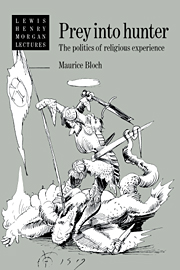7 - Myth
Published online by Cambridge University Press: 15 December 2009
Summary
Chapter 6 consisted of a discussion of the way in which it is possible to reverse the predatory implications of rebounding violence by arresting the progression half-way, at the point when native vitality has been abandoned but before restrengthening external vitality has been consumed. This possibility comes to the fore when political circumstances make all forms of social continuation appear hopeless. In many ways this millenarian transformation can be thought of as revolutionary in that it may lead to political upheaval, as it did in Madagascar in 1863. However, in spite of this political radicalism, there is a sense in which the millenarian option is also intellectually conservative. It does not reject the symbolism of conquest in rebounding violence; it merely seeks to abort the sequence. To find a truly radical challenge occurring on a sufficiently regular basis as to be recorded by ethnographers, it is necessary to leave the realm of organised practice for the most part and move to the freer speculation of what has been called myth. It is, however, quite possible that such speculation may hover in the background and occur quite frequently in the minds of the peoples we have so far discussed, but, nonetheless, only rarely achieve the public formulation which would make the recording of this type of thinking likely.
This chapter deals with such radical rejections, but since these occur in the world of imagination, it leads the argument away from the main concern of the book, which is actual practice and the linked experiences it evokes.
- Type
- Chapter
- Information
- Prey into HunterThe Politics of Religious Experience, pp. 99 - 105Publisher: Cambridge University PressPrint publication year: 1991

